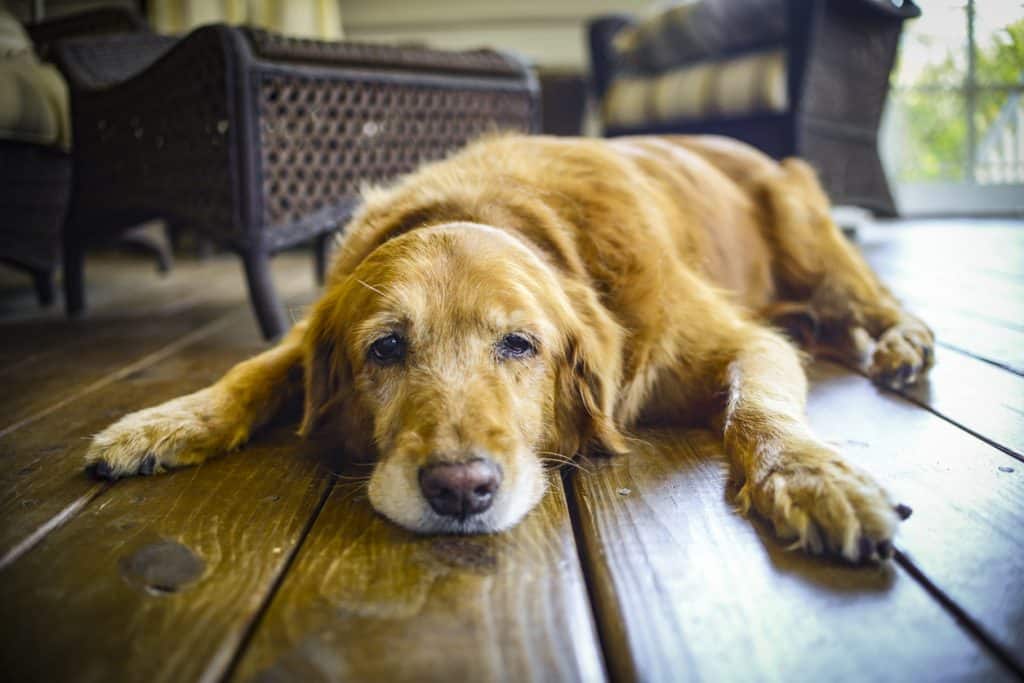While a lethargic dog is not simply tired, lethargy can be explained as extreme tiredness. But it’s a little bit more involved than that. A dog with lethargy might be off their food, won’t want to play and could even refuse treats, depending on the severity of the problem.
Though common in dogs, lethargy can be quite serious. So it’s important to be able to tell when it’s mild, moderate, or severe—and when to see the vet.
Symptoms To Look Out For With Lethargy
If your dog is acting lethargic and showing any of the following symptoms, it’s important to take them to the vet right away:
- Vomiting
- Diarrhoea
- Heavy/laboured breathing
- Struggling to get up
- Shaking
- Appetite loss
- Coughing
- Wheezing
If your dog is lethargic but otherwise normal and eating and drinking still, this is a sign that it is a milder case which they just need to sleep off. However, if you’ve got a lethargic dog who’s lost their appetite, is vomiting or shaking, it’s much more likely to be a serious issue.
Why Is My Dog Lethargic?
Lethargy in dogs can depend on their age. Elderly dogs can be more prone to lethargy as they are older and have less energy. Whereas younger dogs and puppies may get lethargic as their bounds of energy and zest for playing ball might mean they overdo it a bit—especially in hot weather.
Lethargy in puppies
When a puppy is usually very active, wondering why they are lethargic is pretty normal. Common reasons for a lethargic puppy can be related to various illnesses. Among others, these can include:
- Hypoglycemia: can result in weakness, collapse, tremors, seizures (rare)
- Parvovirus: symptoms include appetite loss, fever, diarrhoea, vomiting, shock
- Distemper: causes fever, runny nose, eye/nose discharge, sneezing, vomiting, diarrhoea
- Kennel cough: low fever, runny nose and eyes, sneezing, loss of appetite are among the symptoms

A little Beagle puppy is sleeping
Lethargy in adult dogs
The most common causes of lethargy in adult dogs are conditions such as low thyroid and diabetes.
Dogs most likely to suffer from these problems are mid to large-size breeds, such as Golden Retrievers, Labradors, Dobermans, Dachshunds and Boxers.
Low thyroid causes lethargy and sluggishness as it means a dog is underactive in producing iodine-rich hormones which regulate your pet’s metabolic rate. Further symptoms include swollen thyroid glands, weight gain and bald patches.
Whereas, if your dog is lethargic due to diabetes, it is because of a deficiency in the insulin hormone. The main symptoms of diabetes in dogs are increased thirst, excessive urination, high appetite/overeating, and weight loss.
Lethargy in senior dogs
If your senior dog is acting lethargic it could be for the following reasons:
- Arthritis: causes stiffness, lameness, decreased range of motion, thickening of joints, swelling
- Cancer: symptoms include loss of/decreased appetite, low energy, vomiting, diarrhoea, weight loss, increased thirst, increased urination
- Kidney problems: can result in excessive urination, excessive water consumption, very bad breath, vomiting, diarrhoea, loss of appetite, mouth ulcers (rare)
- Heart disease: causes fast breathing, weakness, exercise intolerance, loss of appetite, weight loss, abdominal swelling, fainting, jaundice
- Liver disease: symptoms include diarrhoea, vomiting, loss of appetite, seizures, fever, jaundice
Even if your elderly lethargic dog just wants to rest all the time, it’s important to keep them moving.

This was my dog Cali’s last day before we had to put her to sleep. She was a great Golden Retriever!
What Is The Difference Between A Tired Dog & A Lethargic Dog?
| Your dog is tired | Your dog is lethargic |
| Sleepy sometimes | Sleeps excessively |
| Uninterested in some activities | Always uninterested in normal activities |
| Prefers to sleep instead of play sometimes | Listless and doesn’t want to play at all |
| Still reacts to stimulation | No reaction to stimulation |
| Still acting like themselves most of the time | Acting out of character |
Mild lethargy. A mildly lethargic dog might be tired out after a particularly exhausting run in the park, especially during hot weather. When you get back home your pup might be very sleepy, but once they’ve snoozed it off, they should be back to their usual selves. It’s probably not necessary to go to the vet, but if you’re concerned you can always give them a ring for advice.
Moderate lethargy. A moderately lethargic dog may continue to show symptoms after resting. However, they should still pay attention to you calling and perk up for a treat. If they have other symptoms you’re concerned about as well, it’s a good idea to book an appointment with your vet in case of an underlying problem.
Severe lethargy. A severely lethargic dog will need to seek veterinary attention. If your dog isn’t responding to you and nothing is getting his or her attention this is likely a severe case and you should call the emergency vet.

Small yellow dog sleeping on a blue sofa
When To Call The Vet
If your dog is moderately to severely lethargic, you should be sure to call the vet or emergency vet as necessary.
Your vet will perform some checks to see why your dog is lethargic, such as seeing if they are dehydrated or doing blood tests. They will then be able to offer the appropriate treatment, whether that’s pain medicine, fluids or antibiotics, for example.
If your dog is suddenly lethargic, try not to worry. Call the vet and they’ll be able to give your dog all the best care they need.



